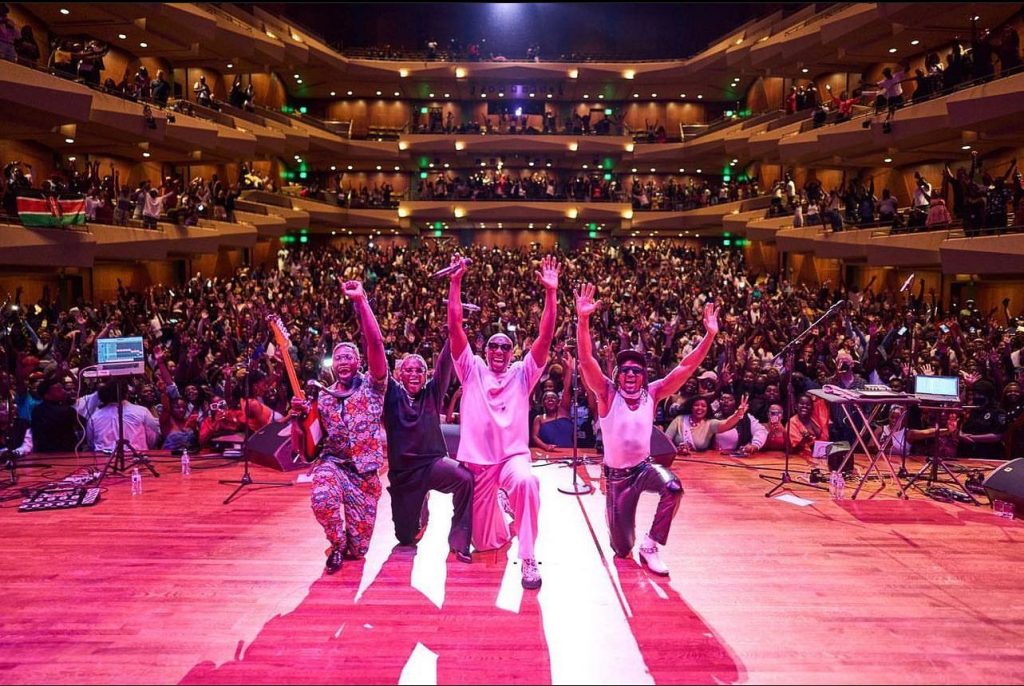From highschool harmonies to global stages, Sauti Sol have morphed into a household name all over the world. From their debut it was clear they were meant for stardom but it was their community approach that have set them apart as musical legends.
East Africa has had her fair share of regional success when it comes to contemporary culture, however internationally it plays second fiddle to West and South African culture. This however changed with the unexpected emergence and rise of the boy band Sauti Sol. Known to many as the East African entertainment poster child, Sauti Sol originally started as a trio consisting Willis Chimano, Bien-Aime Baraza and Savara Mudigi in 2005 while in high school, later on instrumentalist Polycarp “Fancy Fingers” Otieno joined the group. Their debut album ‘Mwanzo,’ which translates to start, premiered in 2009 and was a cumulation of indie-soulful songs ranging from love anthems such as “Lazizi” and socially conscious themed single “Blue Uniform.” It is on rare occasions do we find artists making it out with their first album but Sauti Sol clearly had prepared for this moment. “We would go practice despite not having a show or anyone knowing us,” Bien Aime points out.
Despite albums not being popular in Kenya at that time, Sauti Sol continued with the alternative run and released their second album dubbed ‘Sol Filosofia.’ Once again they created a timeless capsule of music that perfectly depicted Kenyans and their sound. From the melancholic “Coming Home,” to the cathartic “Soma Kijana,” and as if foreshadowing their success in “Sol Generation,” their signature blend of Swahili,Sheng (Slang) and English quickly earned them a spot in every Kenyan’s heart. They redefined not only what Kenyan music could sound like but what it represented on the continental and global stage.
For nearly two decades Sauti Sol stood as a beacon of innovation, representation and excellence and in 2020, the group graced us with ‘Midnight Train,’ their last album as a group that acted as the final chess move. The album acted as a bridge between East Africa, West and South Africa and basically the whole world. With a multitude of stellar collaborations between international artists from “Brighter Days” featuring Soweto Gospel Choir to “My Everything” featuring India.Arie and “Wake Up” featuring Jamaican artist Mortimer, Sauti Sol had surpassed their regional vision and were ready to take on the world. They showed aspiring artists that Kenyan entertainment could stand shoulder to shoulder with Africa’s biggest exports.
Five years later, a lot has happened. From the sudden hiatus of Sauti Sol as a group to the pursuit of the members’ individual careers and the rise of a new class of Afro-Pop artists, Sauti Sol has played a role in acting as a cornerstone for their success across the country. Sauti Sol’s playful take on relationships, social issues and urban life resonated with a generation that craved authenticity in an industry previously dominated by our West and South African counterparts. In the wake of their hiatus, Nairobi’s musical landscape is enjoying a period of transformative expansion, unmistakably coloured by the band’s legacy yet charged with fresh creativity.
Still we can’t fail to recognize the ripple effect that came about with the groups success and their constant participation in developing the artistry in Nairobi and Kenya as a whole. As the group gained regional and international success they dived into helping the community. They tapped into Sauti Academy which started informally in 2008 and is founded by Natalie Lukkanaer and has helped nurture artists such as Bahati and Willy Paul. Together with Sauti Sol under Penya Record, Sauti Academy became a one year artist development program where the former offered mentorship to upcoming artists such as Elani, H_art The Band , Njerae and more. Their commitment to mentorship and collaboration planted seeds that continue to bear fruit in Nairobi’s entertainment scene. At the moment, Njerae is one of the most streamed Afro-Pop artists in Nairobi. With the constant participation and involvement in the entertainment scene Sauti Sol didn’t just open doors but instead showed a new generation of artists what it means to build sustainable careers, embrace live performances, experiment with sound and dream beyond Kenya’s borders.

In 2019, the group finally launched its record label dubbed Sol Generation with Bensoul and Nviiri The Storyteller as their first signees. Through the label, the group offered the two industry guidance and creative freedom. Bensoul broke into the scene with a pop love song dubbed “Lucy,” and from the first second, you are able to tell Sauti Sol’s influence and midas touch on the single in 2020 he went ahead to release his debut EP ‘Qwarantunes,’. From the witty takes on love to the lyricism that capture the transmogrification of Nairobi and the cultural ebb and flow of the country it was clear he was a Sauti Sol protege. Bensol’s soulful ballads and reggae-tinged hits have won him a devoted fanbase, with two EPs and two albums under his belt, he has been dominating Kenyan charts with his singles and projects receiving multitude success. With a mission to ensure artists, songwriters and everyone involved in the song creation process gets a seat at the table, Sauti Sol also launched Sol Generation Publishing arm under the Sol Generation label. The main aim is to ensure songwriters get their due rights signing them under the publishing company and under the umbrella they have become a home to numerous artists including fast rising duo Watendawili.
With Sauti Sol stepping back as a group and taking charge of the business side, they left a fresh canvas ready to be dominated by the children they raised. From Njerae, Nviiri The Storyteller and Bensoul the blueprint was already laid and it has enabled new cats to join the game. But their impact is more than just mentorship. Throughout their run, they consistently challenged the social norm from socio-political views, to gender identity and even sound production itself. There is no one to replace them but that is the main point. Instead the city is buzzing with diverse sounds, subcultures, and experimental sound that speaks to us, the youth. It is thanks to Sauti Sol that we have NuNairobi/Alternative music taking over the local airwaves and even being one of the most streamed genres in the country. New names such as Maya Amolo, Xenia Manasseh, Maali, Nah Eeto, Kodong Klan are the new torch bearers of Nairobi Music each with their own spin towards their music. We are seeing more artists relying less on receiving label support and approaching a DIY perception which was heavily visible with 4MR Frank White’s album ‘Taigwa Goma.’ Released earlier on in the year, 4MR Frank White did a whole social media campaign promoting his project with no support from mainstream media and a record label. It garnered over 300,000 listens on Spotify in less than two months. This is an immediate ripple effect caused by Sauti Sol as they were independent. Karun constantly states that Sauti Sol pushed her to be more experimental with her sound and she is one of Kenya’s biggest musical exports making an appearance on the Spotify X Colors show curated in Nairobi in 2023.


Sauti Sol’s influence has permeated every layer of Nairobi’s landscape. By raising artistic standards, mentoring new voices, and embodying a confident, globally minded African mentality. They catalyzed a cultural renaissance in Kenya that lives on in diversity and collaborative energy. If Sauti Sol’s journey has taught artists anything, reinvention is necessary. Nairobi past the Sauti Sol era has brought a new definition into creation of music. It is not defined by a single voice or style but its aggressive plurality that requires you to pay attention. There is no longer one group carrying the Kenyan music weight on its shoulders. Instead the mosaic of sounds that are raw, polished, genre-bending, streetwise, global and echoing Sauti Sol’s core message: music is limitless when it dares to be itself.

